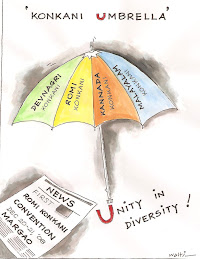History of Konkani – Our Mother tongue
By lifeisanovel
We have tried to trace the evolution of Konkani from the days of the fledgling Indian civilization in the Saraswati River valley to its present status as the official language of Goa.
The word “Konkani” is used to describe both a language of the Indian subcontinent and a group of people. It is derived from “kum”, meaning “Mother Earth” and “Kana”, meaning ‘dust’ or ‘atom’. Thus, Konkani would mean “a part of Mother Earth”. This appellation could well describe the hardy people of the Konkan region, who are primarily farmers and fishermen. The Konkani people trace their history as far back as the fourth millennium BC and they share their name with the coastline and the language they speak.
The journey of our ancestors did not complete within a day or two. It took centuries and so did our language it took many forms and was inspired by many languages. When our ancestors resided in Trihotrapura they came in contact with other languages such as Maithili, Magadhi and Ardha Magadhi with a result that a new language, Konkani took shape.
Thus when they reached Goa, it appears along with Sanskrit they had taken Konkani also, and Konkani began its evolution as a vernacular form of Sanskrit. Konkani did not show any traces of influence of any other language till around the 16th century. The members of this branch of languages draw heavily from the influences of Sanskrit, widely considered to be one of the oldest languages in the world. Striking similarities are evident between the languages derived directly or indirectly from Sanskrit in the Indo-Aryan family. This made Konkani also one of the languages of the Indo-Aryan family. Since Konkani was their contact language through which they communicated with others they became Konkani’s. The locality where they resided became Konkan.
They were migrating from place to place and although times were changing, our ancestors never abandoned their duties and culture. This was the main reason that while in Goa, they could not tolerate the harsh treatment meted out to them by the Portuguese in the name of religion. To preserve their own religious faith and culture, leaving behind everything, home, wealth and cattle, they migrated overnight southwards to Bhatkal, Mulki, Mangalore, Calicut and Cochin.
During this time the original scripts and epics written in Konkani were burnt by the Portuguese. In the process of migration, a lot of literary wealth in the form of folk tales, songs, sayings, proverbs etc. was lost. Because of lack of support and patronage by the rulers, the language did not thrive though it survived. As a result, the literary tradition of the Goan Konkani’s seemed doomed. Also they never migrated to one single place and their homes were scattered all over India. This resulted in the language not having a common script. Therefore, in Konkan Devanagari script was followed. While in Goa it was Roman, in Bhatkal they followed Kannada and Persian, while in Mangalore again they followed Kannada. Some of them also migrated to Kerala and here the Malayalam scripts were used.
Obviously even in the schools, the education was imparted in the local language of the respective states and Konkani did not receive much importance and position. And so it became weak and poor, they still somehow managed to retain the language as mother-tongue. As generations rolled, the younger generation could not manage to keep up with the language and took up speaking the local language of the state they resided in, as a result of which the language received a further blow.
However, every coin has two faces. On one side if the consequences of the inquisition left Konkani with a large variety of influences on the flipside, the inquisition ensured the rich diversification of Konkani into distinctive and melodic dialects across the Indian sub-continent. Although lacking a script, Konkani’s derives pride in the fact that their language is considered to be the original tongue of the ancient Saraswat Brahmins.
Tags: Goa, history, india, Indo-Aryan, konkani, languages, Mother tongue, Sanskrit
This entry was posted on December 12, 2008 at 1:22 pm and is filed under GSB. You can follow any responses to this entry through the RSS 2.0 feed. You can leave a response, or trackback from your own site.
http://mykonkani.wordpress.com/2008/12/12/history-of-konkani-%e2%80%93-our-mother-tongue/
Subscribe to:
Post Comments (Atom)


No comments:
Post a Comment